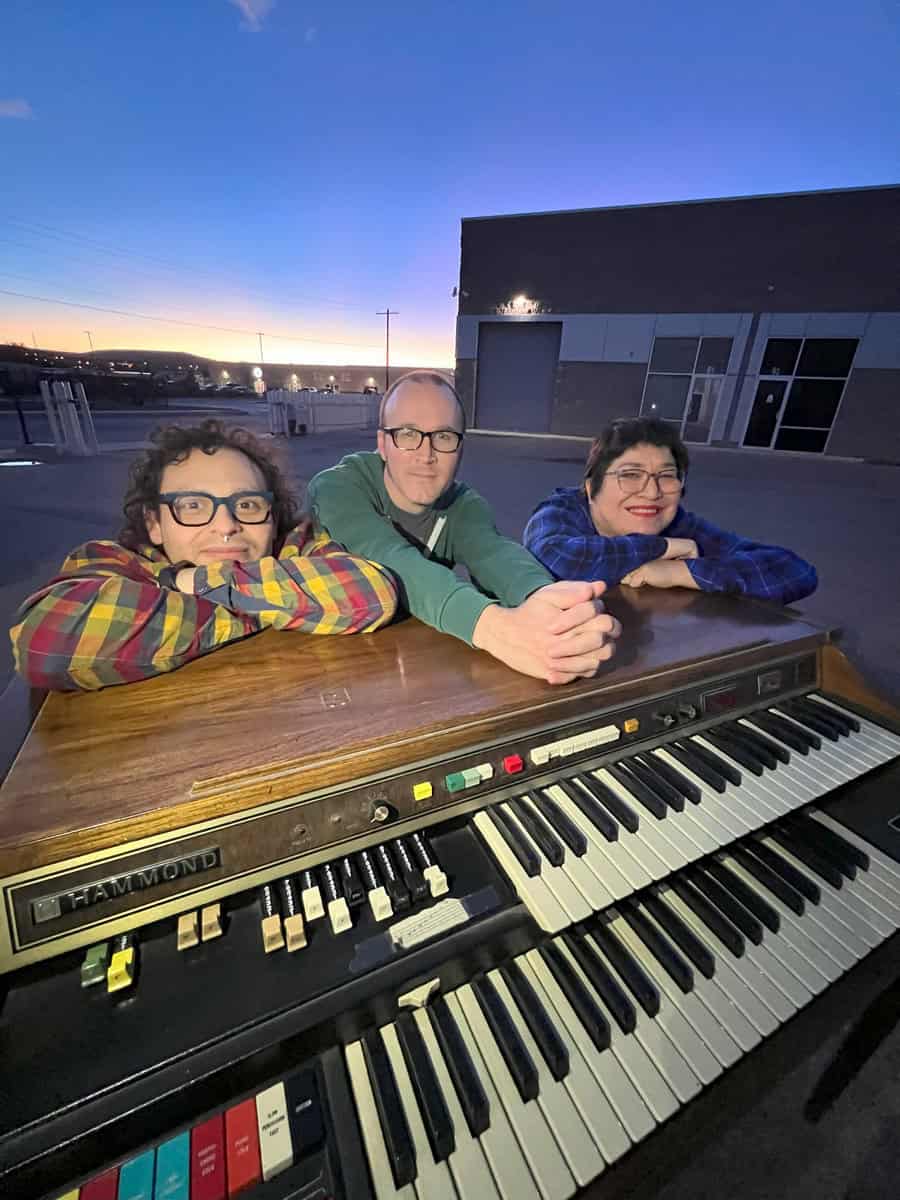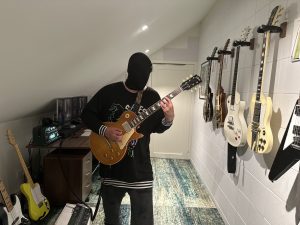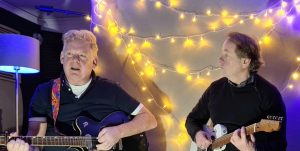EEP, the El Paso-based trio, has always been about embracing the unexpected. Their latest album, You Don’t Have To Be Prepared, is a testament to this philosophy, born from a serendipitous discovery and a willingness to let go of control.
The album’s genesis lies in a found audio recording – a message from a woman named Anne, leaving her old life behind for a new love in El Paso. This recording, discovered on a vintage tape recorder, became the catalyst for EEP’s exploration of love, risk, and the beauty of embracing the unknown.
Musically, You Don’t Have To Be Prepared sees EEP expanding their sonic palette. While their shoegaze roots are still present, the album incorporates elements of dream pop, experimental rock, and even hints of playful pop sensibilities. “Ghost,” the opener, sets the tone with its kaleidoscopic blend of crisp guitars, layered harmonies, and swirling synths. Tracks like “Here’s What I Want You To Forget” showcase the band’s willingness to experiment, with its intricate percussion and layered textures.
The album is not just sonically adventurous, but also thematically rich. Anne’s journey becomes a metaphor for the band’s own evolution, navigating change and embracing new possibilities. “Always” captures the optimism and excitement of new beginnings, while the title track, a pre-existing song that seamlessly integrates into the album’s narrative, speaks to the power of letting go and allowing life to unfold.
To celebrate the release of You Don’t Have To Be Prepared, Music Crowns caught up with EEP to discuss the release in more detail.
You Don’t Have To Be Prepared revolves around themes of love, change, and embracing uncertainty. How did these themes resonate with the band’s personal and creative journeys?
Ross: There’s been a constant change, etc., with the band – from lineup changes to personal life and health changes to just all the various hurdles that any creative group has to leap in order to just finish making something.
Rosie: We had two band members leave after the second album and a third band member leave after we finished this record. It was always interesting because something would happen in our lives. We show up to the studio and I tell Ross, well, this happened. And once in a while we just say, ‘Well, you don’t have to be prepared.’ It became a mantra for the year, because there were so many changes in our personal lives and in the band and in having the studio and not having the studio.
Ross: There’s a lot of upheaval going on in everyone’s lives involved in that record.
Rosie: And I almost felt like, because ‘You Don’t Have To Be Prepared’ was the first song we worked on on the album, that it just felt like that was the theme. That there’s so many times in our lives where we have to just kind of be, not to be cliché, but like that feather on the wind in ‘Forrest Gump’ that lands, and then it goes off again somewhere else and it still exists no matter where it’s being taken to.
Could you tell us a bit about Anne and what about her story inspired you to create the album?
Ross: So we don’t actually know anything beyond what’s on the tape. We made a decision early on that we weren’t gonna try to hunt this person down. We assume that they’re either elderly or gone at this point because we got the organ and the tape player from an estate sale. Just from context, it sounds like she’s probably 50s to 60s, so not a young woman. But for her to be open to the idea of falling in love and uprooting her life to go across the country to be with the one she loved was really inspiring and beautiful. It was a reminder to not let go of that kind of youthful, wide-eyed optimism and willingness to take risks and chances. And that at any point in your life, no matter your age, your life can change radically one way or the other at any moment.
Rosie: Ross had spoken about this tape probably five years before we even worked on the record and he had transferred it to digital. One day we just all sat and listened to it, which was about 38 minutes, right? More or less. And so we listened to it, and then the thought just crossed all of our minds, What if we wrote songs about this? What if we wrote in her voice or in general of anyone who’s going through these kinds of changes, and it just kind of evolved from there.
Ross: Yeah, we decided to take her storyline and expand on and fictionalize it as our basis for all the songs.
How did you translate Anne’s journey into specific songs, such as “Always,” which reflects her new life in El Paso?
Ross: We put together a rough arc of the story to try to figure out which portions we wanted to talk about and what the important transitions were. ‘Always’ is sort of like arriving in El Paso and moving into the house or being ready to arrive there and that kind of anticipation. And then we have things like ‘Clay Center’ that’s very much about leaving this town that presumably she’s been in her whole life and how big of a change that is. But also on top of that kind of fear and anxiety, there’s all this cocky optimism that’s sort of like, ‘Oh, don’t look for me there, I’ll be gone.’
It was really fun to write about. And then just the trepidation of any relationship with things like ‘Here’s What I Want You to Forget.’ The sort of fear of the new person that has an idealized view of you finding out the things about you that are less positive or less flattering and what they’re gonna do with that information and how you’d rather they just remember the good parts.
Rosie: Because I think in the fictionalized story, we had some sort of misunderstanding happen between them. At some point, they had met before and there was a misunderstanding. And that’s what the ‘here’s what I want you to forget’ came from.
Ross: He also sounded like from the context, because you don’t hear his voice, but just the way she talks about him and the way she talks about his life, it sounds like he’s probably older as well. He’s living with his mother, which means this is probably his first real love or first, at least that he’s pursued, or at least he’s probably not been seeking or not finding a relationship or love for a long time. That’s a generalization about men in their 50s or 60s living with their mothers, but it’s probably pretty valid.
Rosie: The song ‘Always’ was always going to be a song about joy, the joy of finally bringing your life together with another person’s in a house.
Ross: Yeah. We made a priority also not just to talk narratively about the events of this story, but try to cover each major kind of emotional thing that they would go through. Because again, it’s a big risk, a big shift, a big change. Relationships in general are risky and can be scary and exciting and beautiful. But especially when you talk about a single woman moving from Kansas to El Paso in the late 70s, early 80s, and probably in her 50s or 60s, that’s a pretty big, pretty gigantic change to make in someone’s life. And so there’s gonna be a lot of complicated emotion related to that. We want to really dig into all of it, not just tell a romanticized, happily ever after story.
Rosie: Yeah, and the photographs in the hallway were a big visual for us, where all of a sudden you had these strangers, but when you put them together in the hallway as a group of photos, they are family now. And then I love the line, I think you and Seb came up with this one – ‘All the things that we have carried/Become the blood within our veins.’ Like everything we’ve been through has led us to this moment and it’s becoming part of us, it’s now part of who we are – that’s really lovely.
How did the absence of a drummer push you to explore new roles and sounds throughout ‘You Don’t Have To Be Prepared?’
Ross: We all ended up playing drums or at least some percussion. I think your drums didn’t make it to the record, right?
Rosie: I played percussion and I played cymbals.
Ross: Yes, that’s right. So, we all played at some point a drum set – not all of that made it on the record, but we all played it and then we just embraced the challenge. I’ve always been very into electronic and sample-based music and drum machines and things like that, and kind of shared that addiction with Rosie and Sebastian. So, we had a lot of fun trying to decide where we want to try to play a traditional drum part, where we want to play something and loop it, or where we want to program something from scratch as well as combining those three things.
There’s a lot of places where we layer real drums over looped drums or vice versa. We have three drum tracks on ‘Here’s What I Want You to Forget’ and one of them is basically loops. I played a full take and then we found the best pieces and turned them into loops and sections, and then I played another take over the top of that, and then a friend of ours played another take on top of those, and then made that into a three-layer drum part.
And there’s some where we took sounds and turned them into drums. I know there’s a couple places where we just took some sort of noise or sound and put it into the sampler and gave it a percussive envelope and turned it into a percussion instrument and drums, so really we embrace it as just another way to expand our palette and try new things.
You described the studio as a “fourth member.” How did this approach affect the album’s sound and direction?
Ross: We’ve always tried to be fairly open-minded about the studio and we kind of heavily endorsed the Brian Eno mantra of the studio as a musical instrument. But this one, especially with the reduction in members and the changes that that created, combined with having worked together on two other records, we had a much stronger understanding of where we all wanted to go musically, much more trust for each other creatively.
It was a lot less of a traditional write a song, learn a song, record a song process. It was much more writing in the studio using sound and the recording process as part of the writing process, and delving into sounds and melodies and things to see where they took us with a little bit less pre-planning.
Rosie: Nothing was too precious
Ross: Yeah, letting the process and the technology open up doors for us and give us close to endless possibilities really.
Rosie: We threw the paint on the canvas, looked at it, and took some of it away and added more. So, they were an iterative process. And sometimes we’d go back to a song that we thought we had finished, and then realize, ‘Oh, let’s do something else.’ I think that’s really helpful.
Ross: Some of the songs wouldn’t come out fully formed, they would come out as maybe a riff or a loop or a melody and we would record what we had and then live with it for a while and see where that went. And like Rosie said, iterate on that further and further, kind of develop the songs from just the basic chords and melody to something hopefully a little more interesting and exciting.
This album features elements of dream pop and experimental rock layered over your shoegaze roots. How did you decide to incorporate these new textures?
Rosie: Each of us came to this project with varied influences and we found as our process progressed that the songs themselves informed us. Our aim was to interpret the story and music with freedom and a spirit of “what if” that helped us evolve as musicians. Synths and unusual new sounds spurred us in new directions.
The mantra “You don’t have to be prepared” is central to the album. How did this mindset impact your creative and personal lives during the making of the record?
Ross: Any time that you’re writing about anything you’re going to have to pull from your own experiences and emotions. I have to find ways that things I’ve experienced or seen relate to what Anne went through and to try to find that common emotional ground.
Rosie: I went through a very similar experience as Anne in the relationship that I’m in currently where I moved from one city to another to be with my beloved and I know exactly that anticipation. It’s just so hard to wait to be with the person you want to be with and you have to cut ties in a way that isn’t comfortable sometimes to be able to make that change to be with your loved one.
Ross: When my wife and I were first together, we ended up long distance for a period. So, I can definitely sympathize with that aspect of it – the anticipation and following someone somewhere else and knowing that that requires sacrifice and tie cutting, but knowing that’s what you want. No matter how certain you are, the uncertainty is never gone.
Rosie: It’s excruciating and yet when the moment comes that you’re finally together in your space, it’s really satisfying.
Are there particular songs on the album that feel especially personal or significant to the band?
Rosie: For me, one that stands out is ‘You Don’t Have To Be Prepared,’ which was the first song that we did. I was really sick and I got some really bad news that made me worry if I was going to be around and it was really an emotional time for me. We wrote ‘You Don’t Have To Be Prepared” and it wound up being like my mantra and I think it became everyone’s mantra for this year, especially getting through that difficulty with my health, which thank goodness is over.
It just let me know that sometimes you don’t have control over what’s happening in life, you don’t have to be prepared. You don’t have to know how to respond to everything – sometimes you can just let time take care of certain things, sometimes you have to just allow things to happen. And that was really important for me that year and I know it was you, too.
Ross: As we mentioned earlier, it was kind of a strong period for all three of us in the band and there were a lot of things to adjust to and deal with and plan around a lot of change. That song definitely became a mantra for all of us.
Rosie: I know ‘Ghost’ was important, too.
Ross: Yeah. When you’re dealing with those upheaval things, letting go can always be a challenge and there was a lot going on that we all had to let go of during the period of this record. Also, the piece of that song that we started from was something I’d been dragging from town to town for a while. I wrote that in San Antonio around 2008 or 2009, so a long time. I had tried to fit it over other songs and other frameworks and I always liked the melody and the lyric but I just could never quite get it to the finish line. Then, I brought it into the band and when the three of us dug into it, it just kind of came together very quickly and easily.
How has the process of creating ‘You Don’t Have To Be Prepared’ influenced your future direction as a band?
Ross: I don’t know. We try to make every record different, so there’s that. It was the most ambitious thing we’ve done for sure – having an overarching theme and story arc, particularly one that has somewhat concrete underpinnings and a bit of a responsibility. We all felt kind of responsible to Anne to tell the story in a way that was, I don’t necessarily say positive because I mean I don’t think we were afraid of the negative sides of the story. But we wanted to honor the story, and not turn it into something trite, not turn it into something silly or overly romantic or overly pessimistic. We wanted to try to tell it as a real-world story. And knowing that there are real people tied to the story somewhere, and that it came with a kind of artifact that is almost like a tabula rasa, I felt a big responsibility to tell the story well. I wanted to make sure that the songs are really good, and the story was really good, and that we were faithful to that material and honored it in a proper way.
Rosie: For me, my grandfather always said, ‘You’re not really dead until all the people who speak of you are dead.’ And so in recording this, I feel like there is a possibility that Anne is going to live forever – that maybe even after we’re gone, somebody’s going to find that record and they’re going to listen to it. It always crossed my mind while we were working on it that Anne’s not really gone.
Ross: Yeah, it is very cool. We got to tell her inspiring love story to other people.






